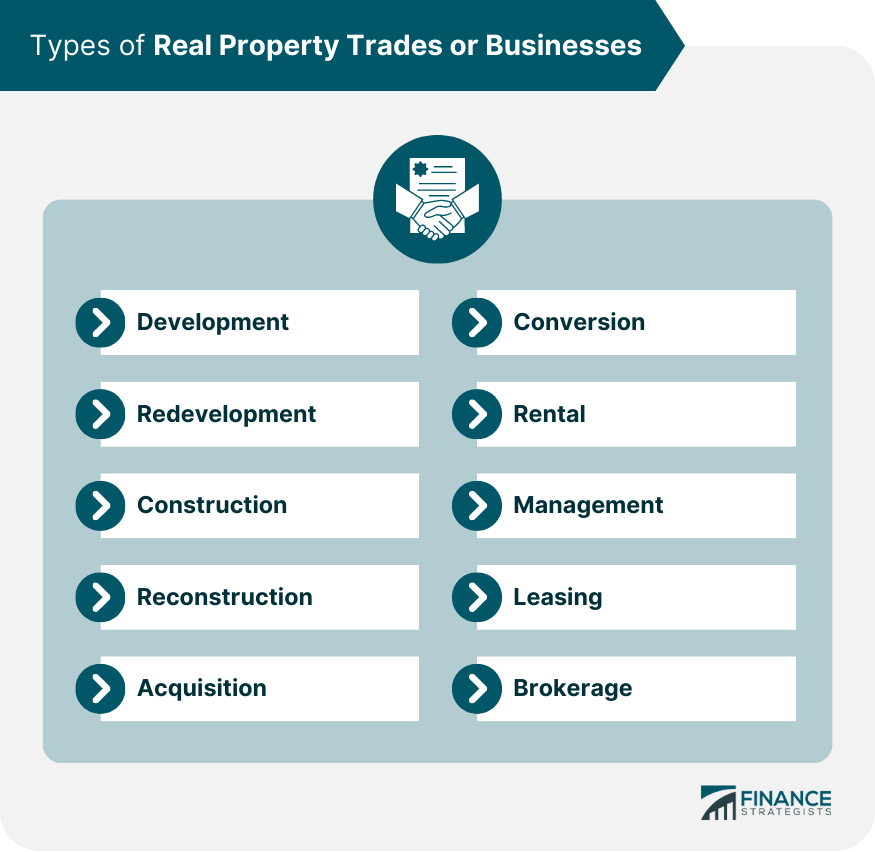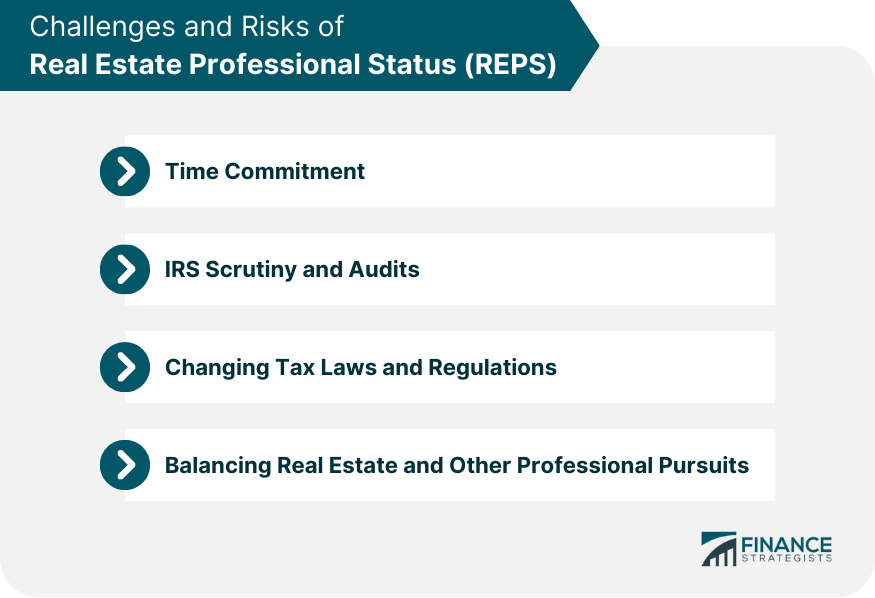Real Estate Professional Status (REPS) is a designation recognized by the Internal Revenue Service (IRS) for individuals who spend a significant amount of time working in real property trades or businesses. Achieving this status can provide substantial tax advantages and benefits for those who qualify. To be considered a real estate professional by the IRS, individuals must meet specific criteria related to the amount of time they spend working in real property trades or businesses. There are two main requirements that individuals must meet to be considered real estate professionals by the IRS: 1. More than 50% of their personal service time must be spent in real property trades or businesses. 2. They must perform at least 750 hours of service in real property trades or businesses per year. The IRS considers various activities to be part of real property trades or businesses, including: Development involves creating new real estate projects, such as building residential or commercial properties from the ground up. This process includes land acquisition, zoning, obtaining permits, designing structures, and constructing buildings. Redevelopment refers to the process of transforming existing properties or areas to improve their value or utility. This may include renovating old buildings, repurposing underutilized spaces, or revitalizing entire neighborhoods. Construction encompasses the building and assembly of new structures, including residential homes, commercial buildings, and industrial facilities. This category covers various tasks, such as excavation, framing, plumbing, electrical, and finish work. Reconstruction is the process of rebuilding or repairing a damaged property. This activity may involve restoring a property after a natural disaster, fire, or other event that has caused significant damage. The acquisition involves the purchase or transfer of ownership of real estate properties. This can include buying individual homes, commercial buildings, or large investment properties. Conversion refers to the process of changing the use or purpose of a property. Examples include transforming a warehouse into a residential loft building or converting a single-family home into a multi-unit rental property. Rental activities involve leasing residential or commercial properties to tenants. Property owners who manage and lease their own properties or who own multiple rental units may qualify for real estate professional status based on their rental activities. Management activities include the day-to-day operations of real estate properties, such as maintaining and repairing properties, collecting rent, overseeing contractors, and addressing tenant issues. Property managers or owners who actively manage their own properties can qualify for real estate professional status through these activities. Leasing involves the process of negotiating and executing rental agreements between property owners and tenants. Professionals who work in leasing may help property owners find and secure tenants or represent tenants in their search for suitable rental properties. Brokerage activities involve representing clients in the buying, selling, or leasing of real estate properties. Real estate brokers and agents who spend significant time in these activities may qualify for real estate professional status. Individuals who qualify for real estate professional status can enjoy significant tax advantages related to their real estate investments. The IRS typically classifies rental income as passive income, which is subject to limitations on loss deductions. However, real estate professionals can treat their rental income as active income, allowing them to deduct losses without limitation. Real estate professionals can fully deduct rental losses against their other income, which can reduce their overall tax liability. Real estate professionals can take advantage of accelerated depreciation on their rental properties, allowing them to claim larger deductions in the early years of property ownership. Real estate professionals can potentially avoid the 3.8% NIIT on their rental income by treating it as active income rather than passive income. When selling a rental property, real estate professionals can benefit from the lower tax rates associated with long-term capital gains, which can result in significant tax savings. To maintain their real estate professional status, individuals must adhere to specific recordkeeping and ongoing education requirements. Proper recordkeeping is crucial for substantiating real estate professional status to the IRS. This includes: Time logs and calendars detailing work hours in real property trades or businesses. Contracts and invoices related to real estate activities. Educational materials and certifications to demonstrate industry knowledge and expertise. Real estate professionals must stay current with industry trends and regulations through: Continuing education courses. Real estate conferences and seminars. Networking events. Subscribing to industry publications. While obtaining real estate professional status can provide significant tax benefits, there are potential challenges and risks to consider. Meeting the IRS requirements for real estate professional status can be demanding, particularly for individuals with other professional pursuits. Real estate professionals may face increased scrutiny from the IRS, which could result in audits and potential adjustments to their tax returns. Tax laws and regulations can change over time, which may impact the benefits and requirements associated with real estate professional status. Individuals who seek to maintain real estate professional status while also managing other careers or businesses may find it challenging to devote the necessary time and resources to both. Real Estate Professional Status (REPS) is a designation recognized by the IRS for individuals who spend more than 50% of their time working in real estate trades or businesses and perform at least 750 hours of service per year. The types of real property trades or businesses include development, redevelopment, construction, reconstruction, acquisition, conversion, rental, management, leasing, and brokerage. The benefits of REPS include the ability to deduct rental losses against other income, accelerated depreciation, avoidance of the 3.8% net investment income tax, and long-term capital gains treatment. However, maintaining REPS can be demanding, and individuals may face increased scrutiny from the IRS, changing tax laws and regulations, and challenges balancing real estate and other professional pursuits. Proper recordkeeping and ongoing education and industry involvement are crucial to maintaining REPS.What Is Real Estate Professional Status (REPS)?
Qualifications for Real Estate Professional Status
IRS Requirements
Types of Real Property Trades or Businesses

Development
Redevelopment
Construction
Reconstruction
Acquisition
Conversion
Rental
Management
Leasing
Brokerage
Tax Benefits of Real Estate Professional Status
Active vs Passive Income Classifications
Deduction of Rental Losses
Depreciation Benefits
Avoidance of the 3.8% Net Investment Income Tax (NIIT)
Long-Term Capital Gains Treatment
Maintaining Real Estate Professional Status
Recordkeeping and Documentation
Ongoing Education and Industry Involvement
Challenges and Risks of Real Estate Professional Status

Time Commitment
IRS Scrutiny and Audits
Changing Tax Laws and Regulations
Balancing Real Estate and Other Professional Pursuits
Final Thoughts
Real Estate Professional Status (REPS) FAQs
Real estate professional status (REPS) is a designation recognized by the IRS for individuals who spend a significant amount of time working in real property trades or businesses. Obtaining this status provides substantial tax advantages, such as treating rental income as active income and deducting rental losses without limitation.
To qualify for real estate professional status, you must meet two main requirements: 1) spend more than 50% of your personal service time in real property trades or businesses, and 2) perform at least 750 hours of service in real property trades or businesses per year.
Real estate professional status offers several tax benefits, including treating rental income as active income, fully deducting rental losses, accelerated depreciation, potentially avoiding the 3.8% Net Investment Income Tax (NIIT), and benefiting from long-term capital gains treatment when selling a rental property.
To maintain your real estate professional status, you must continue meeting IRS requirements and adhere to proper recordkeeping and documentation practices. Additionally, staying current with industry trends and regulations through ongoing education, conferences, seminars, networking events, and industry publications is crucial.
Challenges and risks associated with real estate professional status include the significant time commitment, increased IRS scrutiny and potential audits, changing tax laws and regulations, and balancing real estate activities with other professional pursuits.
True Tamplin is a published author, public speaker, CEO of UpDigital, and founder of Finance Strategists.
True is a Certified Educator in Personal Finance (CEPF®), author of The Handy Financial Ratios Guide, a member of the Society for Advancing Business Editing and Writing, contributes to his financial education site, Finance Strategists, and has spoken to various financial communities such as the CFA Institute, as well as university students like his Alma mater, Biola University, where he received a bachelor of science in business and data analytics.
To learn more about True, visit his personal website or view his author profiles on Amazon, Nasdaq and Forbes.











